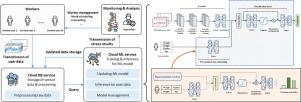基于可穿戴传感器的医疗保健应用的基于监督对比学习的应力检测
IF 6.2
2区 计算机科学
Q1 COMPUTER SCIENCE, THEORY & METHODS
Future Generation Computer Systems-The International Journal of Escience
Pub Date : 2025-08-10
DOI:10.1016/j.future.2025.108058
引用次数: 0
摘要
物联网(IoT)技术的进步使得通过可穿戴设备进行持续的生理监测成为可能,显著改善了个性化医疗服务。基于生理信号的自动压力检测是数字卫生系统的一项关键功能,可实现及时干预并减少严重的健康风险。尽管深度学习最近取得了进展,但有效地捕捉一般人类压力模式和个体特定变化仍然是一个核心挑战。为了解决这个问题,我们提出了一种新的深度学习框架StressCon,它完全集成了对比学习和元数据融合,在适应个体特征的同时学习强大的压力模式。此外,我们的方法联合优化两个对比损失函数来学习主题不变特征,然后利用用户元数据进行个性化应力检测。我们在两个公开可用的数据集上使用Leave-One-Subject-Out (LOSO)验证对所提出的方法进行了综合评估。结果表明,StressCon将分类准确率提高了3.49%,F1-score提高了3.48%,同时在不同人群中保持了一致的最先进性能。这些发现证实了所提出方法的卓越泛化能力和实际适用性,证明了基于物联网的应力监测系统在群体水平的鲁棒性和个体个性化之间的有效平衡。本文章由计算机程序翻译,如有差异,请以英文原文为准。

Supervised contrastive learning-based stress detection for wearable sensor-based healthcare applications
Advancements in Internet of Things (IoT) technology have enabled continuous physiological monitoring through wearable devices, significantly improving personalized healthcare services. Automated stress detection based on physiological signals is a critical function in digital health systems, enabling timely interventions and reducing severe health risks. Despite recent progress in deep learning, effectively capturing both general human stress patterns and individual-specific variations remains a core challenge. To address this, we propose StressCon, a novel deep learning framework that fully integrates contrastive learning with metadata fusion to learn robust stress patterns while adapting to individual characteristics. Furthermore, our method jointly optimizes two contrastive loss functions to learn subject-invariant features, and then leverages user metadata for personalized stress detection. We comprehensively evaluate the proposed method on two publicly available datasets using Leave-One-Subject-Out (LOSO) validation. Results show that StressCon enhances classification accuracy by up to 3.49% and F1-score by up to 3.48%, while maintaining consistent state-of-the-art performance across diverse populations. These findings confirm the superior generalization capabilities and practical applicability of the proposed approach, demonstrating an effective balance between population-level robustness and individual personalization for IoT-based stress monitoring systems.
求助全文
通过发布文献求助,成功后即可免费获取论文全文。
去求助
来源期刊
CiteScore
19.90
自引率
2.70%
发文量
376
审稿时长
10.6 months
期刊介绍:
Computing infrastructures and systems are constantly evolving, resulting in increasingly complex and collaborative scientific applications. To cope with these advancements, there is a growing need for collaborative tools that can effectively map, control, and execute these applications.
Furthermore, with the explosion of Big Data, there is a requirement for innovative methods and infrastructures to collect, analyze, and derive meaningful insights from the vast amount of data generated. This necessitates the integration of computational and storage capabilities, databases, sensors, and human collaboration.
Future Generation Computer Systems aims to pioneer advancements in distributed systems, collaborative environments, high-performance computing, and Big Data analytics. It strives to stay at the forefront of developments in grids, clouds, and the Internet of Things (IoT) to effectively address the challenges posed by these wide-area, fully distributed sensing and computing systems.

 求助内容:
求助内容: 应助结果提醒方式:
应助结果提醒方式:


